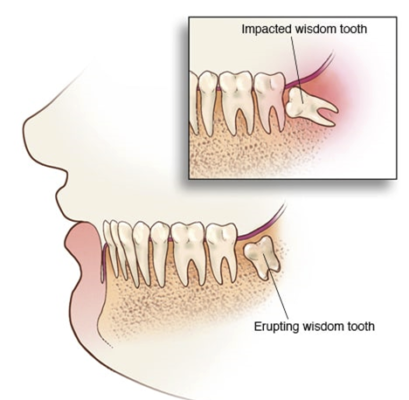
Did you know that your wisdom teeth are also referred to as your third molars?
The majority of patients have their wisdom teeth removed to give their smile more room and to keep their oral cavity healthy and clean. Others do not need to have them extracted at all because they comfortably fit alongside their other adult teeth.
Dentists and oral surgeons are both capable of performing this procedure, and it is a very successful one at that. However, depending on the case, sometimes more advanced measures are needed – a prime example is when these teeth are impacted or only partially erupted. If you are dealing with pain and discomfort because of an impacted wisdom tooth, please do not hesitate to contact our dentist in Millwoods. They are here to ensure that you are looked after and will get your smile back to beautiful in no time.
What Exactly are Wisdom Teeth?
You are most likely familiar with wisdom teeth – they are located on top and bottom, at the very back of your mouth. On average, most individuals have four in total.
These teeth are like any other – they can fit in seamlessly with your smile or, depending on how they grow, can lead to a number of issues. Wisdom teeth that are fully erupted do not usually need surgery to be removed; your dentist or oral surgeon will numb the target site, then use a special pair of forceps to take out the tooth. The empty socket will be stitched up afterward.
Teeth that are partially erupted or not at all require more complex means to be removed safely. The dentist will clear away any bits of gum tissue or bone debris to access the tooth first.
What are Impacted Wisdom Teeth?
Known as impaction, this refers to teeth that, as the name suggests, erupt in a way that causes them to harm neighboring teeth; most often they are trapped in your gum tissue or in the jawbone below. Multiple problems can arise from this including, but not limited to:
- Overcrowding
- Bacteria and food debris gathering around the teeth, causing decay
- Pericoronitis (inflamed tissue around the impacted tooth)
- Periodontitis (gum disease)
- Jaw dysfunction
- Halitosis (bad breath)
- Facial swelling
- Severe pain and sensitivity
- Swollen lymph nodes, fever, and headaches may also occur.
If you are dealing with any of these symptoms, especially the last three symptoms listed above, please visit a dental clinic right away for urgent care. The dentist will closely examine your mouth physically and by taking x-rays to understand the specific details of your case and what the best approach is moving forward – most likely, it will entail undergoing wisdom tooth extractions near you. They will be sure to tailor the treatment so that it suits your unique oral health needs and preferences.
Types of Wisdom Tooth Impaction
There are two main forms of wisdom tooth impactions:
-
Soft tissue impaction
This is when your molar has fully emerged from your jawbone, but it has not pushed through the gum tissue.
-
Hard tissue impaction
This occurs when the molar has not erupted from the jawbone or through the gums.
Though this may sound like a bit of a scary thing to have to deal with, rest assured, it is by no means uncommon. Approximately 90% of patients have at least one wisdom tooth that is impacted, according to the American Academy of Oral and Maxillofacial Surgeons.
Classifications of Impacted Wisdom Teeth
Alongside tissue impaction, impacted wisdom teeth can be categorized based on the unique angle that the tooth itself is growing at.
These are noted below:
Mesial –
The impacted tooth is tilted towards the front of your mouth.
Distal –
The tooth is pointing towards the back of your mouth.
Vertical –
This occurs when the tooth is in the proper position for a healthy eruption, but it is still trapped underneath the gum tissue.
Horizontal –
This happens when the tooth is laying on its side beneath the gum tissue. This form of impaction can cause severe pain due to the excess pressure they cause to the adjacent teeth.
Mesial impactions are the most prevalent form, while distal impactions tend to be very rare.
Removing Impacted Wisdom Teeth
It is important to extract impacted wisdom teeth so that they don’t cause further damage to your smile, dental health, and general health, especially if they are infected or causing you to experience great discomfort. This process is a form of oral surgery that dental professionals with advanced training and expertise perform.
Outlined in detail below are the routine steps involved in wisdom teeth extractions in Millwoods:
Step 1) An oral assessment
Once you are settled in the dentist’s chair, the dentist will thoroughly evaluate your oral cavity. They will take a series of X-rays too so see what’s happening beneath the surface of your gums, tooth roots, and surrounding bones. This will also help them identify which teeth need to be extracted.
Step 2) Providing anesthesia
To make certain that your treatment goes by as smoothly as possible, your dentist will provide you with local anesthesia. This numbs the surgical site and keeps you comfortable and out of pain. If you deal with dental anxiety or fear, you may want to consider receiving sedation dentistry.
Step 3) Tooth removal
Your dentist will cut into your gums to clean any debris or bits of bone that are blocking the tooth from being accessed. When it is all gone, they will be able to extract the molar with forceps, gently rocking it back and forth.
Step 4) Stitches
The surgical site will be sterilized so that bacteria cannot enter and then they will stitch the hole closed. A small square of gauze may be applied too to help stop any bleeding.
Step 5) Aftercare instructions
You will be provided with instructions as to how to care for your mouth in the following days. It is normal for you to experience some facial swelling, bleeding, or soreness in your jaw muscles – these will go away soon. Gently press a cold compress on your cheek and take over-the-counter medications like Advil or Tylenol to manage the pain.
Your dentist will also make you aware of issues and rare but more serious risks associated with this course of treatment. Some of these include:
- Dry sockets, refers to the blood clot that forms in your empty socket after the procedure becomes dislodged. To avoid this, do not use a straw for the first few days following the appointment.
- Bacterial infections from food or other debris can be easily avoided by keeping the area clean following after surgery instructions provided by your dentist.
- Damage to surrounding structures such as nerves and sinuses. This is rare but dentist do make you aware of this possibility.
If these symptoms persist or get worse, contact a dentist near you.
With that said, most patients fully recover from impacted wisdom tooth surgery in two weeks or so. You will be able to get back to school or work a few days or earlier depending on how well your mouth heals after extractions.
Looking for Reliable Dental Care in Millwoods?
If you are dealing with impacted wisdom teeth, it is important to act as quickly as you can – the sooner you do, the more effective your treatment will be and damage to nearby teeth can be minimized or prevented.
At Agape Dental, we provide high-quality oral health care to every patient who walks through our doors. Our staff is dedicated to ensuring that your time with us is pleasant and exceptional. So, if you are in need of a dental procedure, be it wisdom tooth extraction or acquiring dental implants, we encourage you to give our dentist near you a call today!
A healthy smile is an important part of living well, and we are here to help you with that. We are excited to see you very soon!

